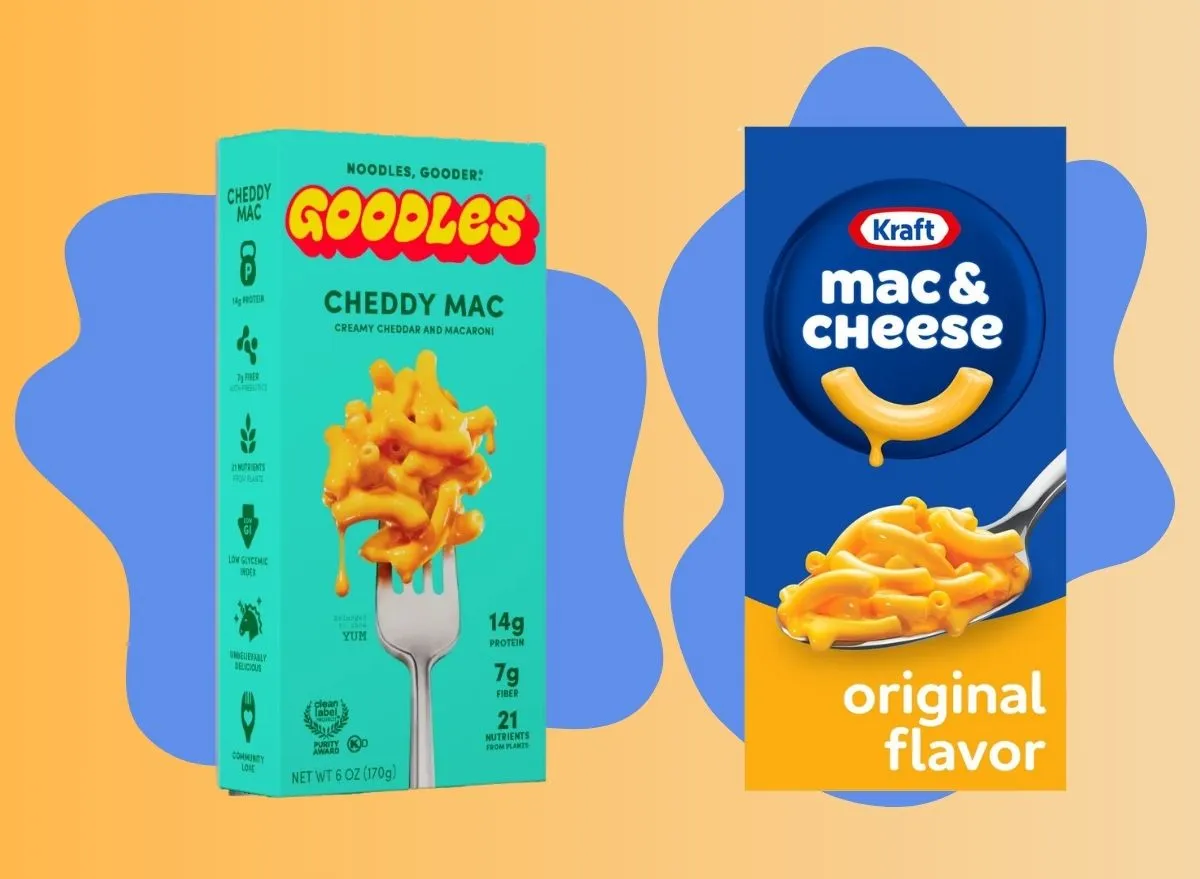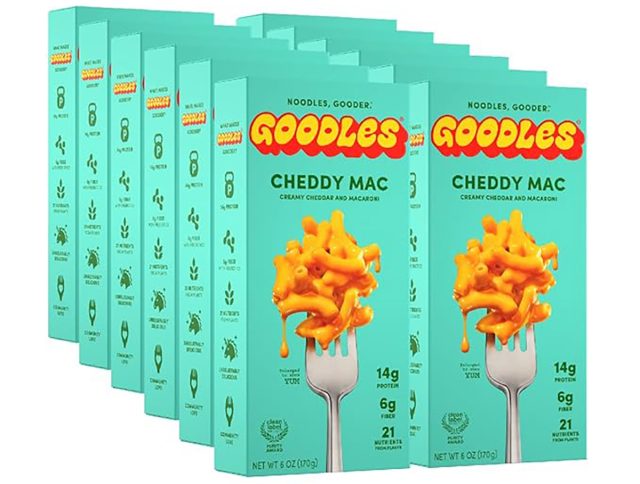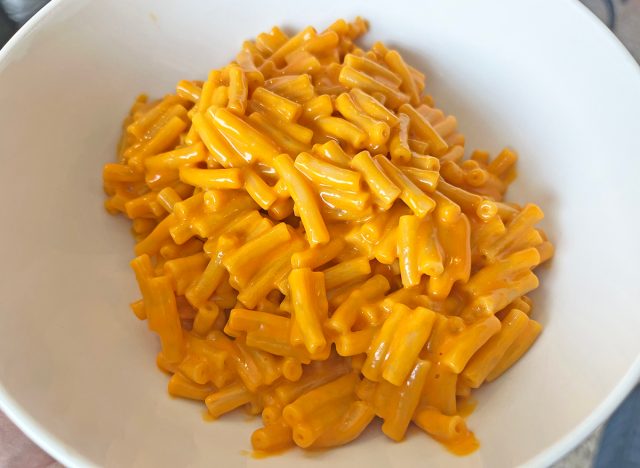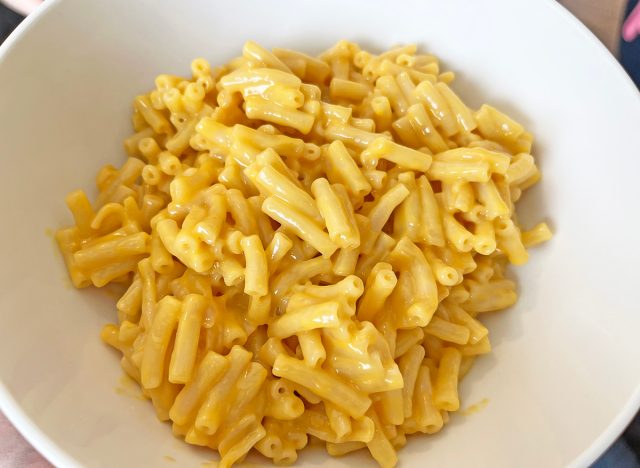I Swapped My Kids’ Mac & Cheese With a Healthier Version & Was Shocked By What Happened Next

Few grocery items are more quintessentially American than boxed macaroni and cheese. Combining non-perishable dried noodles with processed cheese powder is a brilliant Great Depression-era invention that soared in popularity throughout World War II and still remains an easy, cheap, and hearty meal for cash-strapped families in today’s woefully inflation-oppressed times.
The original Kraft macaroni and cheese, in particular, has been a childhood favorite for decades—selling over a million boxes every day, according to the company.
Yet, despite its tremendous popularity and affordability, countless other brands have tried to improve upon Kraft’s proven kid-approved formula, marketing healthier or more wholesome versions over the years with mixed results.
Perhaps the most promising better-for-you option yet comes from Goodles, a California-based company that uniquely instills its cheesy macaroni with a wide range of plant-based nutrients. Dietitians—including several from the Eat This, Not That! medical review board—have raved about this product, calling it “the highest protein-packed mac and cheese we’ve found” and further noting its “gut health-supporting prebiotics,” lack of artificial ingredients, and contaminant-free Clean Label Project certification, among other perks.
RELATED: The Best New Grocery Products of 2024

I know what you’re thinking. Nice try, but this sort of do-gooder alchemy, though well-intentioned, probably tastes like a total disappointment. That’s what I thought, too. Then I tried it for myself and found it surprisingly similar to the real thing.
Then again, I’m pretty open-minded to trying new things like this. My kids, on the other hand, are far less inclined, particularly when it comes to fancier upgrades of foods they know and love.
I wanted to see whether Goodles was actually good enough to potentially replace the classic Kraft mac in our afterschool or dinnertime repertoire. But I also knew that my kids would probably never participate in a head-to-head taste test if they knew the full details upfront. My 9-year-old daughter, especially, is a fierce Kraft mac loyalist. I had zero doubts about the negative impact that full transparency would have on the results of such an experiment.
So, I decided to take a different approach. The next time she requested her beloved Kraft mac, I would secretly prepare the Goodles Cheddy Mac (the brand’s closest flavor to the usual blue-box stuff) and serve that to her instead, just to see what happened.
When that day finally arrived, I was very excited to see the results—and highly skeptical about Goodles’ chances.

Goodles Cheddy Mac (Per 1 Cup Prepared)
Calories: 270
Fat: 4 g (Saturated Fat: 2 g)
Sodium: 600 mg
Carbs: 48 g (Fiber: 7 g, Sugar: 7 g)
Protein: 15 g
The printed directions are virtually identical for both brands: boil until tender (about eight minutes), drain well (do not rinse), return to pan, and stir in 1/4 cup of milk and the included dry cheese mix. The only major difference was the butter. For its “classic prep,” Kraft calls for four tablespoons, while Goodles recommends just two. I stuck as closely to those guidelines as possible
When it was time to serve, I was pretty sure this experiment would be doomed from the get-go. There’s a noticeable difference in color between the two brands. Kraft macaroni has always struck a recognizable vibrant yellow color, while the Goodles version looked closer to orange. Nevertheless, I presented her with a bowl of the cheesy noodles and a spoon, and patiently waited to see her reaction.
To my surprise, when she took her first bite, she simply nodded her head in approval.
“Pretty good?” I asked.
“Mm-hmm,” she replied.
I quickly followed up, “As good as you remember?”
To which, she said, “Better.”
I was shocked. When I tried to press her for more details, however, she simply rolled her eyes and kept eating. Surely, this was a fluke, I thought. So, I tried again a few days later.
This time, she clearly sensed that something was up. “Tastes good,” she said. “Quick question… um, do you know, why is it orange?”
I decided to play dumb and see where the conversation went. My wife chimed in to suggest it was the cheese, which our bright young offspring immediately brushed aside. “No, usually it’s yellow,” she said. “I’m just curious. It doesn’t taste different.” Score another point for Goodles!
The following day, I decided to go back to her regular Kraft mac and see if she noticed anything different this time.

Kraft Macaroni & Cheese (Per 1 Cup Prepared)
Calories: 350
Fat: 11 g (Saturated Fat: 4 g)
Sodium: 710 mg
Carbs: 50 g (Fiber: 2 g, Sugar: 10 g)
Protein: 10 g
“It looks way better than yesterday,” she told me, “and it tastes super good.” She then qualified her remarks, “It tastes the same as yesterday, just really, really good.”
Later, she clarified her position. “The pasta that you gave me earlier today, it actually tasted better because it melted in my mouth,” she said. “It looked better and it tasted better.”
At this point, I felt compelled to tell her the truth. She was not amused and immediately disputed the results, particularly her initial “better” comment. She further claimed to have seen through my ruse and suggested she was simply playing along the whole time.
“Dad, I’m terribly sorry, I’m just such a good actor,” she said. “I saw you swap it out. I ate it because I was acting!” She also told me flat-out that she would never knowingly eat the Goodles version again.
Now, my daughter certainly has a flair for the dramatic, but choking down a food she truly dislikes simply for performative sake—not once, but twice—would represent a whole new level of commitment to the craft.
I’m not buying it. The results stand on their own. Goodles tastes good enough to fool my whip-smart fourth-grader. Perhaps it’s even good enough to please your kids, too.